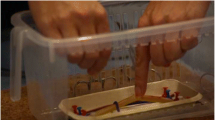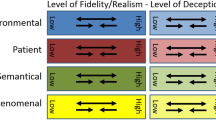Abstract
Medicine is increasingly taught in immersive simulated environments to supplement the apprenticeship model of work-based learning. Clinical research on this educational practice focuses on its realism, defined as a property of simulation technology. We treat realism as a function of subjective but collectively organized perception and imbued with fantasy, which we define by drawing on Lacanian studies of virtual reality and workplace organization. Data from an observational study of four simulation centres in London teaching hospitals is drawn on to present an account of what was taught and learned about medicine, including medical failure, when medical practice was simulated.
Similar content being viewed by others
References
Ahmed, S. (2009) Affect aliens: Happiness as a cultural politics. In: J. Satterthwaite, H. Piper and P. Sikes (eds.) Power in the Academy. Stoke-on-Trent: Trentham Books, pp. 117–134.
Barthes, R. (1957) Mythologies. Paris: Editions du Seuil.
Barthes, R. (1961) The photographic message. In: Image, Music, Text, translated by Stephen Heath. London: Fontana, pp. 15–31.
Bosk, C. (2003) Forgive and Remember: Managing Medical Failure. 2nd edn. Chicago: Chicago University Press.
Cederström, C. and Hoedemakers, C. (eds.) (2010) Lacan and Organization. London: May Fly Books.
CMO (Chief Medical Officer) (2008) Annual Report. Safer Medical Practice: Machines, Manikins and Polo Mints. London: Department of Health.
Costas, J. and Taheri, A. (2012) The return of the primal father in postmodernity? A Lacanian analysis of authentic leadership. Organization Studies 33 (9): 1195–1216.
Curran, I. (2010) Innovation in education - the engine for change. Paper presented at the 3rd Annual STeLI Conference; 15 March, London, UK.
Dean, J. (2010) The real internet. International Journal of Žižek Studies 4(1), http://zizekstudies.org/index.php/ijzs/article/view/242/322, accessed 21 June 2015.
Dejours, C. (2008) Le Facteur Humain. Paris: PUF.
Dejours, C. (2009) Travail vivant 1: Sexualité et Travail. Paris: PUF.
Gaba, D.M. (2004) The future vision of simulation in health care. Quality and Safety in Health Care 13: i2–i10.
Glynos, J. (2008) Ideological fantasy at work. Working paper in Ideology and Discourse Analysis, 23/07/08, http://www.essex.ac.uk/idaworld/working_papers.html, accessed 21 June 2015.
Glynos, J. (2010) Lacan at work. In: C. Cederström and C. Hoedemakers (eds.) Lacan and Organization. London: May Fly Books, pp. 13–58.
Glynos, J. (2011) On the ideological and political significance of fantasy in the organization of work. Psychoanalysis, Culture and Society 16 (4): 373–393.
Hoedemaekers, C. (2007) Performance, Pinned Down: A Lacanian Analysis of Subjectivity at Work. Rotterdam: ERIM.
Hoedemaekers, C. (2009) Traversing the empty promise: Management, subjectivity and the other’s desire. Journal of Organizational Change 22 (2): 181–201.
Institute of Medicine (1999) To Err is Human: Building a Safer Health System. Atlanta: National Academies Press.
Issenberg, S.B., McGaghie, W.C., Petrusa, E.R., Gordon, D.L. and Scalese, R.J. (2005) Features and uses of high-fidelity medical simulations that lead to effective learning: A BEME systematic review. Medical Teacher 27 (1): 10–28.
Johnson, E. (2008) Simulating medical patients and practices: Bodies and the construction of valid medical simulators. Body and Society 14 (3): 105–128.
Johnson, E. and Berner, B. (eds.) (2012) Technology and Medical Practice: Blood, Guts and Machines. Farnham: Ashgate.
Kress, G. and Hodge, R. (1979) Language as Ideology. London: Routledge and Kegan Paul.
Lacan, J. (2007) The Ethics of Psychoanalysis. Edited by J. A. Miller. Translated by D. Porter. London: Routledge.
Lapping, C. (2013) Institutional accountability and intellectual authority: Unconscious fantasies and fragile identifications in contemporary academic practice. In: C. Maxwell and P. Aggleton (eds.) Privilege, Agency and Affect: Understanding the Production and Effects of Action. Basingstoke: Palgrave Macmillan, pp. 88–105.
McGowan, T. (2013) Virtual freedom: The obfuscation and elucidation of the subject in cyberspace. Psychoanalysis, Culture and Society 18 (1): 63–70.
McNaughton, N. (2012) A theoretical analysis of the field of human simulation and the role of emotion and affect in the work of standardized patients. PhD thesis. Ontario Institute for Studies in Education, University of Toronto.
Murray, J. (1997) Hamlet on the Holodeck: The Future of Narrative in Cyberspace. Cambridge: MIT Press.
Nusselder, A. (2009) Interface Fantasy: A Lacanian Cyborg Ontology. Cambridge: MIT Press.
Nusselder, A. (2013) Twitter and the personalisation of politics. Psychoanalysis, Culture and Society 18 (1): 91–100.
Paget, M.A. (2004) The Unity of Mistakes. Philadelphia: Temple UP.
Pelletier, C. (2009) Education, equality and emancipation: Rancière’s critique of Bourdieu and the question of performativity. Discourse: Studies in the Cultural Politics of Education 30 (2): 137–150.
Pelletier, C. (2012) No time or place for universal teaching: The ignorant schoolmaster and contemporary work on pedagogy. In: J.P. Deranty and A. Ross (eds.) Jacques Rancière and the Contemporary Scene. London: Continuum, pp. 99–116.
Rancière, J. (1987) Le Maître Ignorant. Paris: Fayard.
Rancière, J. (2004a) The Politics of Aesthetics. London: Continuum.
Rancière, J. (2004b) The Philosopher and His Poor. Translated by J. Drury, C. Oster and A. Parker. Durham: Duke University Press.
Stavrakakis, Y. (2008) Subjectivity and the organized other: Between symbolic authority and fantasmatic enjoyment. Organization Studies 29 (7): 1037–1059.
Stavrakakis, Y. (2010) Symbolic authority, fantasmatic enjoyment and the spirits of capitalism: Genealogies of mutual engagement. In: C. Cederström and C. Hoedemaekers (eds.) Lacan and Organization. London: MayFlyBooks, pp. 59–100.
Taylor, J.S. (2011) The moral aesthetics of simulated suffering in standardized patient performances. Culture, Medicine and Psychiatry 35 (2): 134–162.
Todorov, T. (1977) The Poetics of Prose. Ithaca: Cornell UP.
Turkle, S. (1995) Life on the Screen: Identity in the Age of the Internet. New York: Simon and Shuster.
Waldby, C. (1997) Revenants: The visible human project and the digital uncanny. Body and Society 3(1): 1–16, http://wwwmcc.murdoch.edu.au/ReadingRoom/VID/Uncanny.html, accessed 21 June 2015.
Waldby, C. (2000) The Visible Human Project: Informatic Bodies and Posthuman Medicine. London: Routledge.
Waring, J.J. (2009) Constructing and re-constructing narratives of patient safety. Social Science and Medicine 69 (12): 1722–1731.
Ziv, A., Wolpe, P.R., Small, S.D. and Glick, S. (2003) Simulation-based medical education: An ethical imperative. Academic Medicine 78 (8): 783–788.
Žižek, S. (1989) The Sublime Object of Ideology. London: Verso.
Žižek, S. (1997) The Plague of Fantasies. London: Verso.
Žižek, S. (1999) Is it possible to traverse the fantasy in cyberspace? In: E. Wright and E. Wright (eds.) The Žižek Reader. Oxford: Blackwell Publishing, pp. 102–124.
Žižek, S. (2004) The cyberspace real, http://www.egs.edu/faculty/slavoj-zizek/articles/the-cyberspace-real/, accessed 23 June 2015.
Žižek, S. (2013) Less than Nothing: Hegel and the Shadow of Dialectical Materialism. London: Verso.
Author information
Authors and Affiliations
Corresponding author
Rights and permissions
About this article
Cite this article
Pelletier, C., Kneebone, R. Fantasies of medical reality: An observational study of simulation-based medical education. Psychoanal Cult Soc 21, 184–203 (2016). https://doi.org/10.1057/pcs.2015.50
Published:
Issue Date:
DOI: https://doi.org/10.1057/pcs.2015.50




